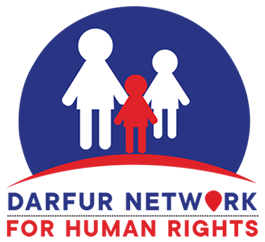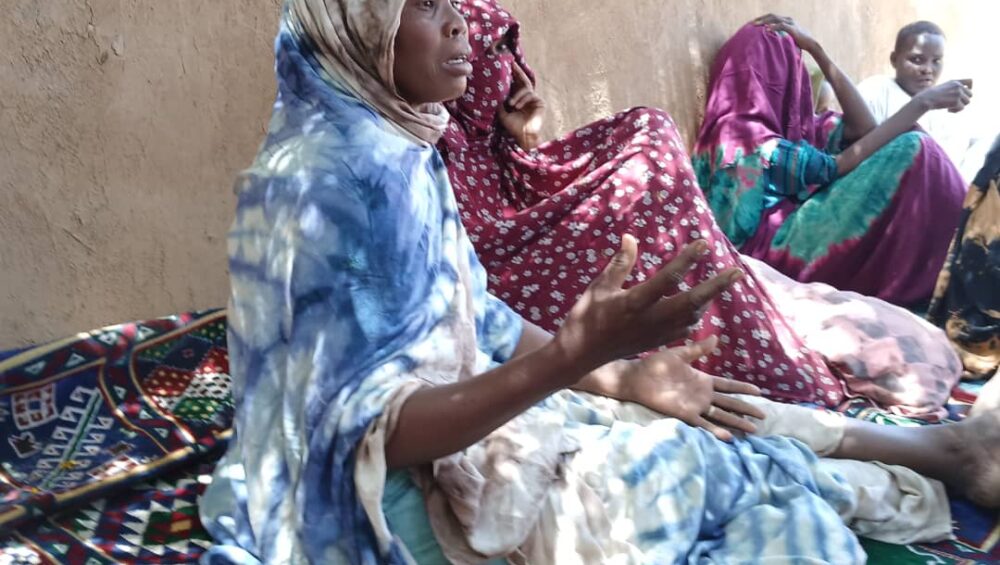April 22, 2025. Nertiti Locality, Central Darfur
The Darfur Network for Human Rights (DNHR) expresses its deep concern over the ongoing mass displacement of civilians from El Fasher city and Abu Shouk IDP Camp, following an escalation of brutal attacks by the Rapid Support Forces (RSF). In particular, the recent massacre at Zamzam IDP Camp in North Darfur has triggered new waves of forced displacement under dire humanitarian conditions.
In a horrific assault on Zamzam Camp, RSF forces carried out a massacre that killed a large number of civilians, including children, women, the elderly, teachers, doctors, and the wounded. The attack resulted in widespread panic and the mass flight of residents in all directions. Field reports confirm that most survivors fled toward Tawila, with many continuing on foot to Nertiti, and others moving toward the Jebel Marra region or attempting to reach Chad. Displacement conditions are described as extremely dangerous and inhumane.
On April 22, 2025, DNHR field monitors recorded large groups of displaced families arriving in Nertiti locality. Most are now sheltering in girls’ secondary schools in western Nertiti, while local families host others with already scarce resources. A smaller number of individuals have reportedly crossed the border into Chad.
Furthermore, DNHR confirms the arrival of more than 25 newly displaced families from Zamzam Camp to Nertiti on Saturday, April 19, 2025, following intensified shelling and RSF attacks. The new arrivals—primarily women, children, and the elderly—described fleeing on foot and by donkey carts, enduring days of heat, dehydration, and trauma. Many families report being separated from loved ones during the journey, raising serious concerns over missing persons.
Testimonies from Survivors
“We suffered greatly along the way—heat, thirst, and exhaustion. We had children and the elderly with us. Some children died under trees due to dehydration. But when we reached Nertiti, the displaced communities here received us warmly and gave us food and water.” Hawa Ali survivor
“We walked for dozens of kilometers—five days on foot—carrying our children on our heads. Some children died on the road under trees due to the heat and thirst. Some families had to leave their children behind. We urgently need international protection and humanitarian aid. Thank you to those who hear our cry.”
— Nadia Abdelrahman Bashir Hamid, displaced from Zamzam Camp
Humanitarian Situation
The displaced populations in and around Nertiti are now facing:
- Severe shortages of food and clean drinking water
- A complete lack of shelter supplies (including mattresses and blankets)
- Rising health risks and urgent needs for medical care
- Serious psychological trauma, especially among children and survivors of violence
Local communities are overwhelmed and unable to provide sustainable support due to the scale and frequency of displacement.
Urgent Calls
- DNHR calls on the UN Refugee Agency (UNHCR), World Health Organization (WHO), and all humanitarian actors to immediately scale up emergency assistance in Nertiti, Tawila, and the greater Jebel Marra area.
- DNHR urges the international community, especially the UN Security Council, to take immediate diplomatic and legal measures to stop RSF attacks on civilians and ensure accountability for gross violations of international humanitarian law.
Conclusion
The repeated targeting of IDP camps in Darfur constitutes a grave violation of international law and continues to threaten the lives of hundreds of thousands of vulnerable civilians. The situation demands urgent global action to prevent further atrocities and uphold the rights and protection of displaced communities.

